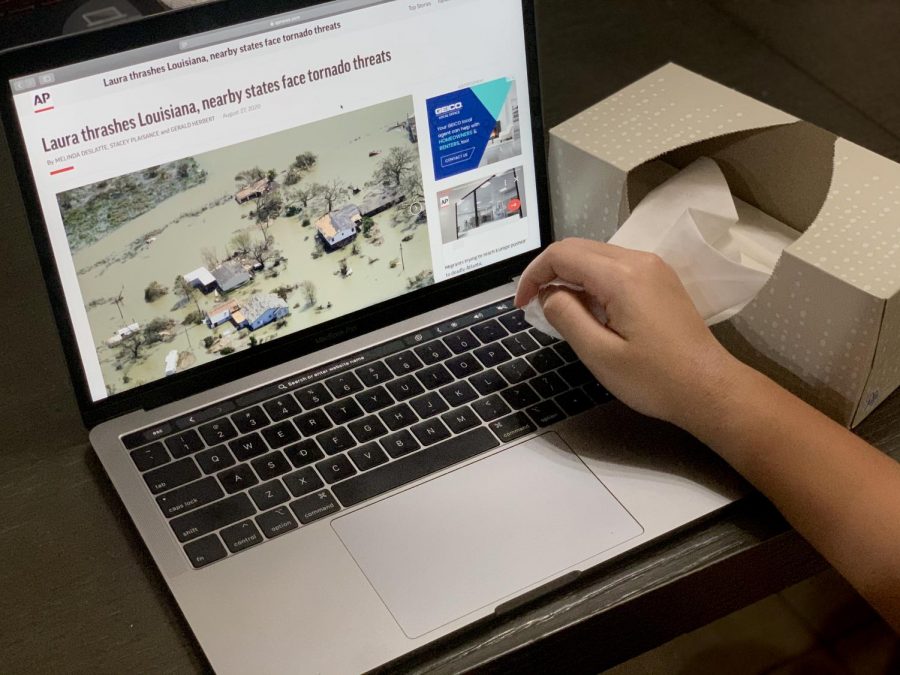HURRICANE LAURA RESPONSE AND HOW TO HELP
Hurricane Laura takes a devastating toll on Louisiana and surrounding states. Stay updated to find out about recovery efforts and how you can help.
September 10, 2020
Record-breaking hurricane Laura devastated Louisiana. The category four storm’s winds, rain, and storm surges flattened towns, flooded neighborhoods, and destroyed mobile homes leaving thousands without shelter and 16 dead (ABC). It is has caused millions of dollars in damages. The storm itself was extremely dangerous, but the oil refineries burst into flames causing massive amounts of damage. This only exacerbates an already terrible situation.
People were already vulnerable due to the COVID-19 pandemic leaving millions unemployed. The pandemic also has effects beyond economic instability for storm victims. It also limits capacity in storm shelters for people without houses or in evacuated areas. This makes storm recovery even more difficult because keeping people safe while social distancing is essential. The Red Cross and other shelters are working with the Center for Disease Control (CDC) and the Federal Emergency Management Agency (FEMA) to prevent the spread of COVID-19 while providing aid to storm victims. Individual hotel rooms are ideal, but congregate sheltering, where people have many shared spaces, is the last resort. However, with the amount of movement needed to keep people safe from the storm, it will not be a perfect situation.
The pandemic is not the only thing that has affected the response to these deadly storms. The Black Lives Matter (BLM) movement has caused problems with storm response in some areas. Lafayette, La. has decided to take in storm victims or provide aid. The city cites a “serious, local, security threat.” The threat they fear is violent protests, and this idea is not new. It has been used for decades to dismiss racial justice campaigns and is completely unfounded, as protests in Lafayette have been peaceful. This has dire consequences for storm victims because normally displaced people can travel to Lafayette to receive help from the local government, churches, and other local humanitarian groups. Laura left 200,00 people without water, so the help is desperately needed (The Washington Post). The failure of water systems has also forced hospitals and nursing homes to evacuate, taking away possible storm shelters. This reduction in storm shelters means that congregate sheltering may become the only option, which will further spread COVID-19 filling up hospitals and creating further problems. The town seems to have no mercy. A spokesperson said “Will they have to go maybe a little farther? Unfortunately, that’s probably the case.”
When asked about the response of towns like Lafayette an IB sophomore, Divya Verma, said “It would only be ethical to provide shelter and aid to storm victims, despite Corona. Providing shelter in a safe way would be a much safer alternative to victims staying with other people. Staying with other people would increase the number of COVID-19 cases, which is the opposite of what we want to do. If there’s a safe way for people to distance themselves in these provided storm shelters, it’s only right to help these victims.”
Essentially, it is exceedingly unethical to deny storm victims shelter because of fear of protests or the spread of COVID-19.
Verma also discussed the reasoning behind aid to storm victims saying “A storm could easily wreck someone’s house, making it unlivable. It would be very dangerous for someone to live there. Thus, it is only right that they are given some other type of temporary shelter (as well as food). It’s not like people are at fault for a storm wrecking their house. They had no control over it. They should be able to easily get the help they need in order to get back on their feet.”
Despite current roadblocks from local governments and a global pandemic, there are ways to help. Various non-profits have sprung into action in the wake of this disaster. Here are a few places to donate to:
- The Red Cross is working to provide medical assistance, emergency lodging, and other essentials. You can also volunteer or donate blood. Make sure to select “Hurricane Laura” when donating.
- SBP provides personal protective equipment to those working to clean up the homes and businesses damaged by the storm.
- The Cajun Navy Relief and Rescue accepts monetary and supply donations.
- You can also donate to a variety of groups at once here.























